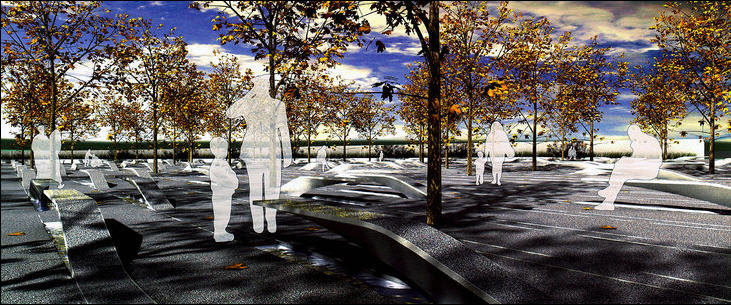
Seven years ago this morning, al Qaeda hijackers crashed two passenger jets into the Twin Towers of the World Trade Center in New York City, another into Ring C of the Pentagon in Arlington, Virginia, and another aimed at an unknown target crashed to the ground in Pennsylvania as passengers bravely took on their captors.
Today, the Pentagon is dedicating its memorial to the 59 innocents aboard American Airlines Flight 77 and the 125 killed in the Defense headquarters. Manhattan continues to struggle to get its memorial off the ground but they, too, will hold memorial services at Ground Zero, with appearances by both John McCain and Barack Obama.
Meanwhile, around the country, the attacks have faded into history and terrorism is well down the list of concerns on the minds of the American public as it moves into the final stretch of the race to choose its next president. Only four percent think terrorism or national security is the most important issue. As Michael Abramowitz notes in today’s WaPo, “Both candidates touched on the subject only briefly in their convention speeches and are emphasizing the economy, change for Washington and other issues on the stump.” Terrorism is at most a proxy issue in this campaign, used mostly as a backdrop for discussions of the wars in Iraq and Afghanistan.
Like other historical events before it, 9/11 is already a dry issue for young people. Eamon Stewart, a freshman at Fordham University whose father was killed in the attacks, notes in today’s NY Daily News that his classmates are quite blase about the anniversary and some are learning about it for the first time from textbooks. They were, after all, only 10 or 11 at the time. He predicts, almost certainly correctly, that ” future generations will look at the event the same way that I looked at the Holocaust for a long time: a sad part of history that I never truly comprehended.”
Time marches on and it’s perfectly natural that the national grief that we shared seven years ago should have faded for the vast majority of us fortunate enough not to lose loved ones in the attacks. And, as we get further away from a major domestic terrorist attack, one can hardly blame the citizenry for moving everyday issues higher up their list of priorities.
That said, the threat has not gone away. Al Qaeda remains viable, if less centralized, terrorism remains a potent weapon of asymmetrical warfare, and the United States has an incredible supply of vulnerable targets. So, while pocketbook and cultural issues will always be with us, voters should certainly think about the candidates’ policies on the terrorist threat and weigh that in their decision.
Jeffrey Goldberg puts it perhaps too dramatically but he’s essentially right:
The next president must do one thing, and one thing only, if he is to be judged a success: He must prevent Al Qaeda, or a Qaeda imitator, from gaining control of a nuclear device and detonating it in America. Everything else — Fannie Mae, health care reform, energy independence, the budget shortfall in Wasilla, Alaska — is commentary. The nuclear destruction of Lower Manhattan, or downtown Washington, would cause the deaths of thousands, or hundreds of thousands; a catastrophic depression; the reversal of globalization; a permanent climate of fear in the West; and the comprehensive repudiation of America’s culture of civil liberties.
This overstates things somewhat; after all, there was not an another attack during President Bush’s second term and it’s still being judged a failure by most. But, as happened seven years ago this morning, a major attack would instantly reprioritize the political landscape, at least for a time. It’s even true, as Timothy Garton Ash spells out in some detail in today’s Guardian, that terrorism isn’t without competition as the most important long-term national security issue. But, again, that could change in an instant.
As Goldberg and Amir Taheri remind us, McCain and Obama offer decidedly stark choices. McCain believes we are fighting a “war” against an “enemy” who hates us for who we are and must be hunted down and killed. Obama thinks “terrorism” is not the enemy, but merely a tactic employed by “extremists” who hate us for our foreign policy and who come from desperate societies without options. While not eschewing military force as a weapon — witness his calls for unilateral action in Pakistan — Obama believes the tools should be diplomacy, intelligence, law enforcement, and humanitarian aid.
This is a real choice and, unlike so many of the things the candidates will promise in their speeches, something over which the president has tremendous control. We shouldn’t return to the mindset of September 12, 2001, when terrorism was viewed as the biggest threat in the history of mankind. Perspective is in order. But we shouldn’t return to the mindset of September 10th, either.
James Joyner is managing editor of the Atlantic Council. Defense Department photo via WaPo.
Image: pentagon-memorial_1.jpg
